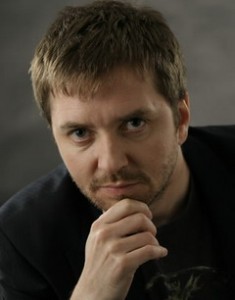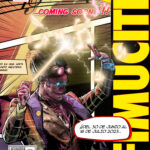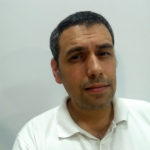Interview: Atli Örvarsson
Inspire, expire… It is not my first interview, but I am quite nervous. My colleagues from AsturScore could not make it to Canary Islands and here I am. Alone. Facing an interview in a language that is not mine.
“Relax, there’s no problem” my girlfriend whispers, grinning like a Cheshire Cat. I check the usual suspects: my notes, recorder and microphone. Suddenly, just before a violent blast of air bursts into the auditorium, Vanesa Bocanegra, from Fimucité’s organization, tells us “Atli Örvarsson is ready.”
My girlfriend and I walk to meet him, in the company of an official translator, in case I need some help. We arrive, take a seat and, after the introductions, I realize that Atli radiates a great tranquility. “Enjoy” I think and, almost without noticing, we are on it.
Rubén Franco
BIOGRAPHY
 Atli Örvarsson became established in the local music scene of his hometown, Akureyri (Iceland), at a young age. He studied film composing at Berklee College of Music and the North Carolina School of the Arts. The award of the Pete Carpenter Fellowship took him to Los Angeles, where he began working alongside TV veteran Mike Post. Soon after that, he met composer Hans Zimmer, who invited him to join his team at Remote Control Studios.
Atli Örvarsson became established in the local music scene of his hometown, Akureyri (Iceland), at a young age. He studied film composing at Berklee College of Music and the North Carolina School of the Arts. The award of the Pete Carpenter Fellowship took him to Los Angeles, where he began working alongside TV veteran Mike Post. Soon after that, he met composer Hans Zimmer, who invited him to join his team at Remote Control Studios.
As a composer, Atli Örvarsson has worked in films as diverse as The Eagle, Vantage Point, Babylon A.D., Thick as Thieves, The Fourth Kind, Season of the Witch, The Mortal Instruments: City of Bones, Hansel and Gretel: Witch Hunters or A Single Shot. Atli’s most recent credits include The Hitman’s Bodyguard and the coming-of-age film The Edge of Seventeen.
What could you tell us about your beginnings in film music?
I think I wanted to be a composer before I realized that I wanted to be a composer. I remember going to the movies as a teenager and being moved by the music in the film, maybe without even realizing it.
Every film composer I’ve talked to of my generation, we all seem to have been deeply affected by John Williams’ music for Star Wars. I was studying music as a young child and I was Luke Skywalker in my mind for about two years after the movie came out. And the music was always there too. So, film music has been with me since I started appreciating the film, even before that.
But it wasn’t until I went to Berklee College of Music that I really started to, sort of, pursue composition for movies. It was kind of a coincidence. I had just learnt about the major and thought it might be interesting to take one course and see what happens. As soon as I started what I call the alchemy of music and pictures together and experimented with that, I knew it was what I wanted to do the rest of my life.
Do you miss being part of a band?
Sometimes. I also realized very early on that touring with an R&R band wasn’t really for me. I’m more comfortable being behind the scenes and working by myself in the studio. But I had a great time, it was fantastic.
There were moments, especially when I was beginning in Los Angeles, maybe I thought to myself once in a while I should be with the band, being successful in Iceland. I love writing music. One of my professors in composition told me if you wanna be a composer, you need to like being alone, because most of the time you’re alone. I like it, so it’s good for me.
What did you learn from working with Mike Post?
The most important thing I learnt from Mike was to not be so critical of every single note that I wrote. It was really out of necessity, because in television you have to write really, really fast. If you work all of it because it’s never good enough, nothing is gonna come out. In a way, you have to find balance.
In addition, doing hundreds of episodes of television teaches you about filmmaking, about drama. It’s almost like doing your PhD in music, because you do so much of it.
And how was working with Hans Zimmer?
Just amazing. Hans is such an incredible creative force. He taught me so much and I’ve just learnt so much for being around him… Very, very challenging and demanding. But he taught me to let it flow. Hans taught me how to get back into the detail and really work it out perfectly.
One of your first assignments, Vantage Point, is set in Salamanca, Spain…
I’ve never been to Salamanca. I actually came on to the film very late. Another composer was supposed to do it; but, because there had been so much delay in the film, he had to go and do other projects that he was hired to do. They needed someone right away, so I was able to get my opportunity as a young composer to jump in.
It was a very challenging project, because, when you get a big opportunity like this… Hans basically told me “all you have to do now is not f… it up”. And, then, you start thinking “oh, my God, I can’t f… it up”. And you get paranoid.
Somehow, it was a fantastic experience. It was one of those projects that, artistically, challenged me to do something different, when you have to go and learn some new things within yourself.
What’s the story behind your assignment to Colette?
I got it through my agent at the time. I decided at some point that I’ve done a lot of action movies and stuff like that and I wasn’t sure if my talent was best used in that field. I really enjoy doing them (I’m working in an action movie right now), but there was another side I wanted to explore.
The idea was: maybe if I do European films I’d get a chance to do sort of more melodic scores, more purely orchestral works, kind of another dimension of music composer. It went well, because I got to do Colette. What’s terrific about it… You get more artistic freedom in Europe. And it shows. Scores are more musical, there’s less percussive music.
I really loved Colette. It’s not something new, new sounds or new ideas that nobody has heard before, but, for me as a composer, it just let me show something from my inner self, a European, classic melodic score.
How was the creative process of working in the independent film A Single Shot?
It was extremely interesting, in that I got to explore another side of myself. The director, David Rosenthal, absolutely loves music. He’s always introducing me to new pieces of music. For example, for A Single Shot, he introduced me to some modernists from 20th Century Europe. He really pushed me into an area I hadn’t really explored before. For me, it was a real discovery.
The truth is, in percussive music, you can’t buy samples with string effects. In this case, I worked out all of these things myself, so I had just to learn how to do it. This is like a dream came true, because not only you get to do your job, but you get actually to expand your knowledge.
Do you feel more comfortable in these type of projects as opposed to a blockbuster?
It is more comfortable, to be honest, because there’s fewer people telling you what to do. But I really enjoy both very much. It’s totally different. It’s very hard to compare both processes. If you take a blockbuster, there are lots of resources: you get a big orchestra, you have budget to do things. As opposed, in the small ones there’s more freedom.
You are a new member of the Motion Picture and Arts Academy…
I’m very excited about it. The Academy isn’t just the Oscars, it’s a functioning organization that works all year long. It’s an important thing to remember that film composers aren’t just composers, they’re also filmmakers. Learning more about making movies is something that I’m passionate about.
Let’s talk about Torrek. What’s the origin of this idea?
All came out from the score from The Eagle. I went on a kind of archeological journey for the music. The film takes place in Scotland, in Roman times, but nobody knows how Roman music sounded like, so the director, Kevin Macdonald, went like “let’s experiment”.
Basically, I ended up in London with two young Irish musicians, brothers, Flaithrí and Eoghan Neff and we were literally jamming in the studio. We had an instant chemistry on a personal and musical level. I had been looking for a way to work with my sister Hilda, something unrelated to film music, and then we had this idea: why don’t we try to combine Irish folk music and Icelandic folk music, but under an electronic umbrella?
What do you expect of tonight’s concert?
It’s very interesting. It’s like going back in time. When Diego Navarro and Pedro J. Mérida asked me to make a suite of Season of the Witch, I was a bit hesitant, but decided to give it a chance. I went back and listened to this music and thought it could be interesting in a concert setting.
Film music and concert music are quite different, obviously. You have to change your expectation about it. It’s not gonna sound like it did in the movie, and it’s not supposed to do so. It’s like getting a new life for the pieces. I’ll have the luxury of not conducting myself and just listening in the audience. I’m looking for the experience.
And, finally, some quick questions. You just have to say one word. First thing that comes to your mind…
 A movie? The Shawshank Redemption
A movie? The Shawshank Redemption
A musical instrument? The trumpet
A composer? Ennio Morricone
A book? Independent People, by Nobel laureate Halldór Laxness
A city? Málaga
A song? Everything in its Right Place (Radiohead)
A TV show? Law & Order




